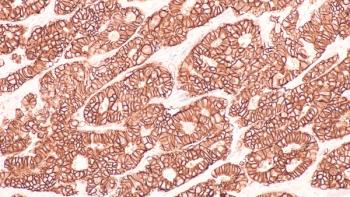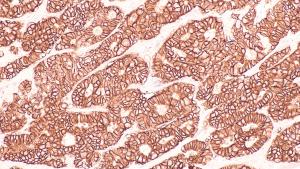Rose DiMarco, PharmD, BCPS, BCOP
Articles by Rose DiMarco, PharmD, BCPS, BCOP

In the final segment, the panelists bring together the major insights from across the series, highlighting the most clinically meaningful data from monarchE, NATALEE, and VIKTORIA-1 and what these findings mean for the evolving role of CDK4/6 inhibitors in both early-stage and metastatic HR+ breast cancer.

In this segment, the experts turn their attention to metastatic HR+/HER2– breast cancer, examining the first results from the VIKTORIA-1 trial evaluating gedatolisib in combination with fulvestrant with or without palbociclib.

In this segment, the experts dive into the monarchE subanalysis evaluating how Ki-67 levels before and after neoadjuvant chemotherapy inform prognosis and treatment planning for high-risk HR+, HER2– early breast cancer.

In this segment, the panel unpacks the 5-year results from the NATALEE trial, which evaluated ribociclib plus a nonsteroidal aromatase inhibitor in early HR+/HER2– breast cancer.

New findings reveal a modest overall survival benefit of abemaciclib in early breast cancer, highlighting the importance of ongoing patient education and treatment strategies.

Panelists introduce key CDK4/6 inhibitor data from ESMO 2025, setting the stage for insightful discussions on pivotal clinical trials and questions.

Unmet Needs in Early and Metastatic Breast Cancer
ByDanielle Roman, PharmD, BCOP, Jodi Taraba, PharmD, MS, BCOP,Heather Moore, BCOP, CPP, PharmD, Rose DiMarco, PharmD, BCPS, BCOP Panelists discuss how unmet needs in early and metastatic breast cancer include overcoming endocrine resistance, improving adverse effect management, ensuring guideline-concordant care, addressing long-term toxicities, and expanding the role of pharmacists in monitoring, clinical trial integration, and advancing the evolving CDK4/6 inhibitor pipeline.

Empowering Patients With Early or Metastatic Breast Cancer
ByDanielle Roman, PharmD, BCOP, Jodi Taraba, PharmD, MS, BCOP,Heather Moore, BCOP, CPP, PharmD, Rose DiMarco, PharmD, BCPS, BCOP Panelists discuss how pharmacists and multidisciplinary teams can empower patients with early or metastatic breast cancer through education, adverse effect management, dose adjustments, frequent follow-up, and integration of CDK4/6 inhibitors with other therapies, while addressing logistical and clinical challenges in practice.

Differences in Dosing Schedules and Total Duration of Therapy
ByDanielle Roman, PharmD, BCOP, Jodi Taraba, PharmD, MS, BCOP,Heather Moore, BCOP, CPP, PharmD, Rose DiMarco, PharmD, BCPS, BCOP Panelists discuss how differences in dosing schedules, adherence challenges, and total duration of CDK4/6 inhibitor therapy impact patient management, treatment decisions, and quality of life in both advanced and early-stage settings.

Dose Reductions and Escalations With CDK4/6 Inhibitors
ByDanielle Roman, PharmD, BCOP, Jodi Taraba, PharmD, MS, BCOP,Heather Moore, BCOP, CPP, PharmD, Rose DiMarco, PharmD, BCPS, BCOP Panelists discuss how dose reductions for CDK4/6 inhibitors are commonly needed due to neutropenia, thrombocytopenia, diarrhea, and other toxicities but do not compromise efficacy based on subgroup analyses from major trials, while dose escalation strategies (particularly starting abemaciclib at 50 mg and gradually increasing) have been successfully implemented based on the TRADE study data to reduce early discontinuation rates by approximately 50%, though practical challenges exist with pharmacy dispensing and patient questions about why escalation to full dose is necessary when lower doses maintain efficacy.

Quality of Life and Multidisciplinary Care Considerations
ByDanielle Roman, PharmD, BCOP, Jodi Taraba, PharmD, MS, BCOP,Heather Moore, BCOP, CPP, PharmD, Rose DiMarco, PharmD, BCPS, BCOP Panelists discuss how evaluating quality of life in patients on CDK4/6 inhibitors requires asking open-ended questions beyond just adverse effects to assess social functioning, work capacity, and emotional well-being (with quality of life data showing these agents maintain rather than significantly improve outcomes), and how multidisciplinary care can be optimized through nurse navigators for additional patient touchpoints, coordination with subspecialty colleagues like pulmonology and cardio-oncology for rare toxicities, and utilizing learners and standardized workflows to manage the high patient volume despite limited pharmacist resources.

Treatment Sequencing and Patient Adherence With CDK4/6 Inhibitors
ByDanielle Roman, PharmD, BCOP, Jodi Taraba, PharmD, MS, BCOP,Heather Moore, BCOP, CPP, PharmD, Rose DiMarco, PharmD, BCPS, BCOP Panelists discuss how treatment sequencing in early-stage breast cancer requires a stepwise approach, adding one therapy at a time (typically radiation, then hormonal therapy, then CDK4/6 inhibitors, with special considerations for BRCA-positive patients receiving olaparib first), while in metastatic settings the sequencing is more straightforward with first-line CDK4/6 inhibitors plus endocrine therapy, and how patient adherence can be optimized through shared decision-making, detailed toxicity education with graded explanations, frequent health care team touchpoints especially during the challenging first 90 days, and addressing the unique adherence challenges in early-stage patients who are asymptomatic compared to metastatic patients.

Underutilization of CDK4/6 Inhibitors in Clinical Practice
ByDanielle Roman, PharmD, BCOP, Jodi Taraba, PharmD, MS, BCOP,Heather Moore, BCOP, CPP, PharmD, Rose DiMarco, PharmD, BCPS, BCOP Panelists discuss how analysis from the Miami Breast Cancer Conference showing 60% of eligible early breast cancer patients are not receiving CDK4/6 inhibitors reflects disparities between academic and community settings, particularly affecting older patients and those with fewer lymph nodes, while identifying remaining unmet needs including better management of quality-of-life impacting adverse effects like fatigue and diarrhea, reducing the burden of frequent laboratory monitoring, and addressing financial toxicity and administrative barriers that affect both patients and health care staff.

Combination Therapy and Key Points in Patient Education
ByDanielle Roman, PharmD, BCOP, Jodi Taraba, PharmD, MS, BCOP,Heather Moore, BCOP, CPP, PharmD, Rose DiMarco, PharmD, BCPS, BCOP Panelists discuss how they are excited about future CDK4/6 inhibitor data including oral SERDs to replace fulvestrant injections, triplet combinations with newer agents, expansion into HER2-positive settings, and the potential role of ctDNA monitoring, while emphasizing key patient education points such as explaining mechanism of action differences from chemotherapy, managing expectations about common adverse effects, setting parameters for when to contact the care team, and providing resources like ChemoCare while also educating health care teams through primary literature and electronic health record care plans.

Role of the Pharmacist in Incorporating Guidelines Recommendations
ByDanielle Roman, PharmD, BCOP, Jodi Taraba, PharmD, MS, BCOP,Heather Moore, BCOP, CPP, PharmD, Rose DiMarco, PharmD, BCPS, BCOP Panelists discuss how pharmacists play a crucial role in toxicity management and monitoring for CDK4/6 inhibitors (including proper QTc calculations, lab monitoring thresholds, and diarrhea mitigation strategies), how they incorporate NCCN guideline recommendations into clinical practice while identifying patients who might fall through the cracks (especially those not receiving chemotherapy), and how they consider sequencing CDK4/6 inhibitors based on postMONARCH trial data for patients with soft progression or low tumor burden without actionable mutations.

Adverse Event Profiles Associated with CDK4/6 Inhibitors
ByDanielle Roman, PharmD, BCOP, Jodi Taraba, PharmD, MS, BCOP,Heather Moore, BCOP, CPP, PharmD, Rose DiMarco, PharmD, BCPS, BCOP Panelists discuss how treatment selection between CDK4/6 inhibitors in early-stage breast cancer is primarily driven by trial eligibility criteria with abemaciclib being preferred when qualified, while in metastatic settings ribociclib is often favored due to overall survival data, and how adverse event profiles differ significantly among the 3 agents (neutropenia with palbociclib/ribociclib, QTc prolongation and drug interactions with ribociclib, and early-onset diarrhea with abemaciclib that typically improves with supportive care management).

CDK4/6 Inhibitors in Visceral Crisis and in Patients With Positive Lymph Nodes
ByDanielle Roman, PharmD, BCOP, Jodi Taraba, PharmD, MS, BCOP,Heather Moore, BCOP, CPP, PharmD, Rose DiMarco, PharmD, BCPS, BCOP Panelists discuss how CDK4/6 inhibitors can be considered for patients with visceral crisis based on limited data from the RIGHT Choice trial (though historically chemotherapy has been preferred), and how the number of positive lymph nodes in early-stage breast cancer drives treatment selection based on the specific inclusion criteria from the monarchE and NATALEE trials, with dual-eligible patients requiring consideration adverse effect profiles and patient-specific factors.

FDA-Approved CDK4/6 Inhibitors for Early and Metastatic Breast Cancer
ByDanielle Roman, PharmD, BCOP, Jodi Taraba, PharmD, MS, BCOP,Heather Moore, BCOP, CPP, PharmD, Rose DiMarco, PharmD, BCPS, BCOP Panelists discuss how FDA-approved CDK4/6 inhibitors are used in early breast cancer (abemaciclib and ribociclib with different trial designs and dosing regimens) and metastatic breast cancer (palbociclib, ribociclib, and abemaciclib showing approximately 2-year progression-free survival advantages in various combination therapies).

Explore the impact of CDK4/6 inhibitors in HR+/HER2– breast cancer treatment and the essential role of oncology pharmacy practice.

Antibody-drug conjugates have revolutionized metastatic breast cancer treatment and classification.

Concluding Remarks: Collaborative Expertise in an Era of Emerging Cancer Therapies
ByHeather Moore, BCOP, CPP, PharmD, Jodi Taraba, PharmD, MS, BCOP, Rodney Hunter, PharmD, BCOP,Jordan Hill, PharmD, BCOP, Rose DiMarco, PharmD, BCPS, BCOP Panelists discuss how there have been many new agents being studied and released at the current time and how the development of these agents is moving at a rapid pace. The adverse effect profiles of newer antibody-drug conjugates create a greater opportunity for pharmacists to be involved in toxicity management.

Interdisciplinary Approaches to Breast Cancer Care and ADC Treatment Barriers Due to Social Determinants of Health
ByHeather Moore, BCOP, CPP, PharmD, Jodi Taraba, PharmD, MS, BCOP, Rodney Hunter, PharmD, BCOP,Jordan Hill, PharmD, BCOP, Rose DiMarco, PharmD, BCPS, BCOP Panelists discuss how optimizing antibody-drug conjugate (ADC) therapy in patients with metastatic breast cancer (mBC) requires interdisciplinary care, including oncologists, pharmacists, and nurses. Adherence barriers such as cost, access, and insurance are addressed via financial and social support.

Discussing ADC Risks, Benefits, and Regimens With Patients
ByHeather Moore, BCOP, CPP, PharmD, Jodi Taraba, PharmD, MS, BCOP, Rodney Hunter, PharmD, BCOP,Jordan Hill, PharmD, BCOP, Rose DiMarco, PharmD, BCPS, BCOP Panelists discuss how health care professionals use clear, tailored communication to explain antibody-drug conjugate (ADC) risks, benefits, and regimens. They provide education, address concerns, and ensure adherence through counseling and shared decision-making.

Optimizing ADC Supportive Care Prescribing and AE Management With Institutional Workflows
ByHeather Moore, BCOP, CPP, PharmD, Jodi Taraba, PharmD, MS, BCOP, Rodney Hunter, PharmD, BCOP,Jordan Hill, PharmD, BCOP, Rose DiMarco, PharmD, BCPS, BCOP Panelists discuss how health care professionals use standardized antibody-drug conjugate (ADC) pathways to guide dosing, adverse effect (AE) management, and transitions. Protocols ensure monitoring, toxicity mitigation, and seamless shifts between therapies for optimal care.

Monitoring Strategies for Managing ADC Toxicities in mBC
ByHeather Moore, BCOP, CPP, PharmD, Jodi Taraba, PharmD, MS, BCOP, Rodney Hunter, PharmD, BCOP,Jordan Hill, PharmD, BCOP, Rose DiMarco, PharmD, BCPS, BCOP Panelists discuss how pharmacists should monitor neutropenia, diarrhea, and mucositis from sacituzumab govitecan (SG); interstitial lung disease (ILD) and neutropenia from trastuzumab deruxtecan (T-DXd); and neutropenia and ILD from datopotamab deruxtecan (Dato-DXd). Proactive management is essential for patient safety.

Managing ADC Toxicities and Infusion Reactions With Supportive Care Strategies
ByHeather Moore, BCOP, CPP, PharmD, Jodi Taraba, PharmD, MS, BCOP, Rodney Hunter, PharmD, BCOP,Jordan Hill, PharmD, BCOP, Rose DiMarco, PharmD, BCPS, BCOP Panelists discuss how antibody-drug conjugates (ADCs) often cause toxic adverse events (AEs). Supportive care includes antiemetics, corticosteroids, and growth factors. Infusion reactions are managed with premedication and slow titration.

Practical Insights for Pharmacists on ADC Administration, Patient Experience, and Supportive Care
ByHeather Moore, BCOP, CPP, PharmD, Jodi Taraba, PharmD, MS, BCOP, Rodney Hunter, PharmD, BCOP,Jordan Hill, PharmD, BCOP, Rose DiMarco, PharmD, BCPS, BCOP Panelists discuss how antibody-drug conjugates (ADCs) often show more diverse outcomes in real-world settings compared with clinical trials, with varying efficacy and adverse effect profiles. Key practical considerations for pharmacists include appropriate dosing based on patient factors, managing drug interactions, implementing premedication protocols to minimize adverse reactions, and providing comprehensive supportive care. Careful monitoring and individualized patient management are essential for optimal therapeutic outcomes.

Personalizing ADC Therapy in mBC Based on Patient Characteristics and Prior Therapies
ByHeather Moore, BCOP, CPP, PharmD, Jodi Taraba, PharmD, MS, BCOP, Rodney Hunter, PharmD, BCOP,Jordan Hill, PharmD, BCOP, Rose DiMarco, PharmD, BCPS, BCOP Panelists discuss how patient characteristics significantly impact antibody-drug conjugate (ADC) therapy selection, with key factors including the presence and location of brain metastases (due to blood-brain barrier penetration), organ function and comorbidities affecting toxicity risks, and prior treatment history that may influence both efficacy and safety. Treatment decisions require careful individualization.

Emerging ADC Clinical Trial Evidence in Breast Cancer Treatment
ByHeather Moore, BCOP, CPP, PharmD, Jodi Taraba, PharmD, MS, BCOP, Rodney Hunter, PharmD, BCOP,Jordan Hill, PharmD, BCOP, Rose DiMarco, PharmD, BCPS, BCOP Panelists discuss how emerging antibody-drug conjugates (ADCs) in metastatic breast cancer (mBC) treatment demonstrate innovation through optimized drug-to-antibody ratios, novel payloads, and targeted approaches to different breast cancer subtypes. Key trials explore combinations with established therapies and potential for improved tolerability profiles. Additional notable studies include comparative effectiveness research between approved ADCs and investigation of biomarker-driven patient selection strategies to maximize therapeutic benefit while minimizing adverse effects.

Key Considerations for Oncology Pharmacists When Selecting and Sequencing ADC Therapies
ByHeather Moore, BCOP, CPP, PharmD, Jodi Taraba, PharmD, MS, BCOP, Rodney Hunter, PharmD, BCOP,Jordan Hill, PharmD, BCOP, Rose DiMarco, PharmD, BCPS, BCOP Panelists discuss how when making antibody-drug conjugate (ADC) treatment decisions for patients with metastatic breast cancer (mBC), pharmacists primarily consider patient-specific factors such as biomarker status, prior therapies, disease burden, and comorbidities. ADCs are typically introduced after standard first-line treatments show inadequacy or in specific molecular subtypes that demonstrate strong responses to targeted therapy.








